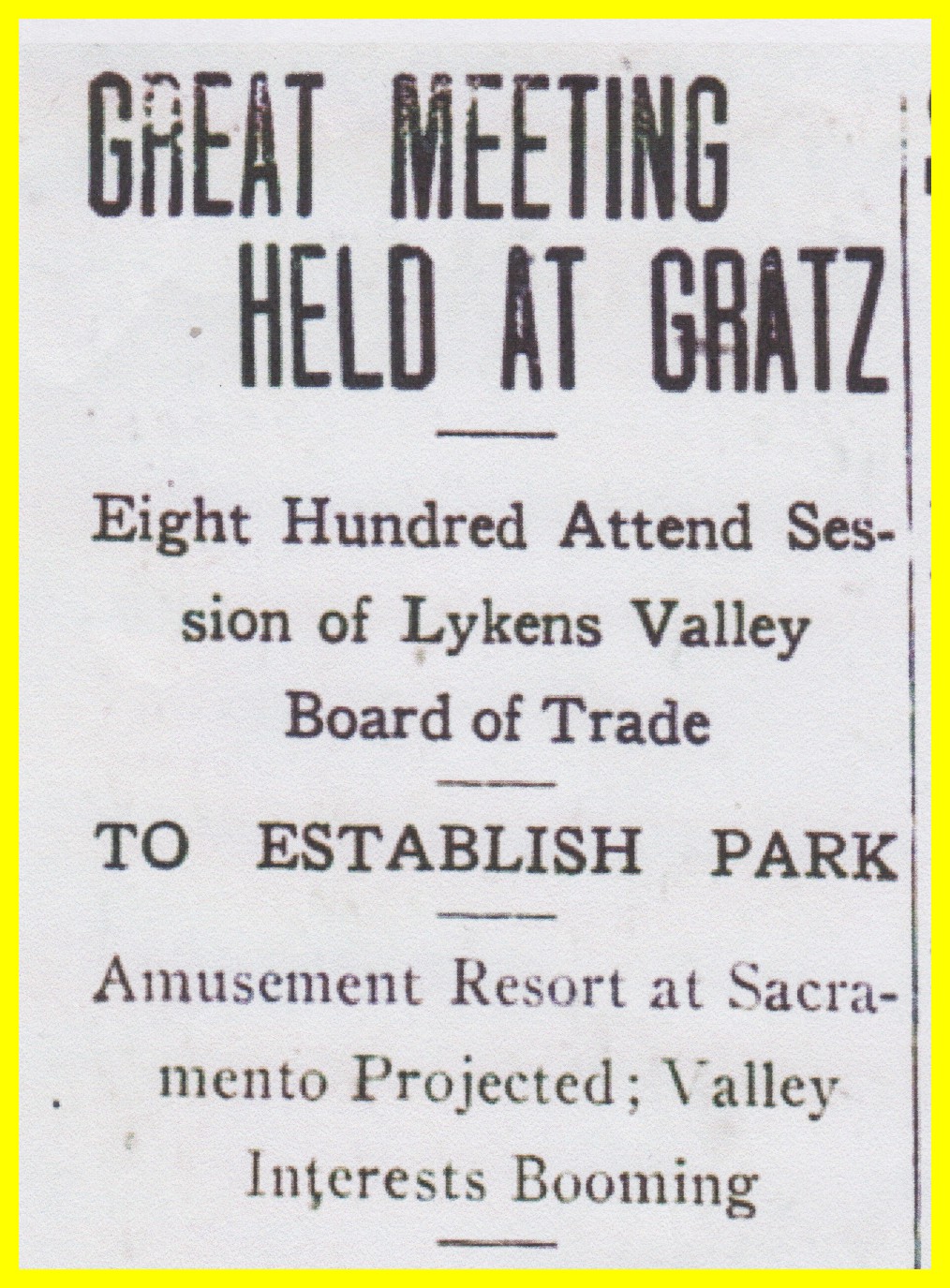 With the plans for the building of the Midland Pennsylvania Railroad came a number of so-called “investors” who sought money-making opportunities in the Lykens Valley. At a meeting held in Gratz, Dauphin County, Pennsylvania, in February 1911, one of those investors, Finley Acker, of Philadelphia, proposed plans for the valley which included an amusement park and resort at Sacramento, Schuylkill County, demonstration farms in the valley, a printing plant in Gratz, and opportunities for farmers to purchase small, “guaranteed fertile” plots of land were scientifically determined as profitable when used for a certain type of agriculture. Were the residents of the Lykens Valley being conned? Or, were the capitalists who descended on the valley honest brokers who had the best interests of the residents as the central selling point in their sales pitches?
With the plans for the building of the Midland Pennsylvania Railroad came a number of so-called “investors” who sought money-making opportunities in the Lykens Valley. At a meeting held in Gratz, Dauphin County, Pennsylvania, in February 1911, one of those investors, Finley Acker, of Philadelphia, proposed plans for the valley which included an amusement park and resort at Sacramento, Schuylkill County, demonstration farms in the valley, a printing plant in Gratz, and opportunities for farmers to purchase small, “guaranteed fertile” plots of land were scientifically determined as profitable when used for a certain type of agriculture. Were the residents of the Lykens Valley being conned? Or, were the capitalists who descended on the valley honest brokers who had the best interests of the residents as the central selling point in their sales pitches?
From the Harrisburg Telegraph, 14 February 1911:
GREAT MEETING HELD AT GRATZ
Eight Hundred Attend Session of Lykens Valley Board of Trade
TO ESTABLISH PARK
Amusement Resort at Sacramento Projected; Valley Interests Booming
Special to the Telegraph
Gratz, Pennsylvania, 14 February [1911] — At a meeting of the board of managers of the Lykens Valley Board of Trade held here at 4 o’clock yesterday afternoon, it was recommended that a public park be established at Sacramento, to be known as Central Park.
Eight hundred men, women, and children attended a meeting of the Board of Trade at 7 o’clock in the evening.
The proposed park at Sacramento is to be forty acres in extent. Finely Acker, of Philadelphia, and W. W. Cole, of New York, engineer for the company which is promoting the Midland Pennsylvania Railroad interests and the development of Lykens Valley, spoke in favor of the establishment of a pleasure spot where the people of the valley may meet from time to time.
Great Night Meeting
People drove from points twenty-five miles distant to attend the Board of Trade meeting, which was opened by the resident of the Sacramento Board of Trade, Quentin Klinger. Rev. Mr. Kressley offered a prayer. R. O. Umholtz made an address of welcome and R. H. Sexton, of Philadelphia, responded. George B. Wells, of Philadelphia, spoke of the interest that Philadelphians are now taking in Lykens Valley. Engineer Cole dwelt upon the advantages of the railroad and gave details of the plans for the proposed park at Sacramento. H advocated the building of bungalows and a hotel to be conducted without a liquor license. The park should, he said, be equipped with merry-go-rounds, roller coasters and all manner of amusements, etc.
Mr. Acker told what the development company proposes to do, emphasizing the resources of the valley, the value of timber lands, coal deposits, etc.
Possibilities of the Farm
J. D. Detrich, of the State Agricultural Department, spoke of the dairy cow and tole of the possibilities of a fifteen-acre tract, upon which he said he had been able to maintain forty head of cattle. He advised against the use of corn in the feeding of cows. A $7,000 mortgage, he said, has been wipe out in a short time on his fifteen-acre tract by the use of scientific methods. He would not, he said, raise wheat; let that to the western farmers. Lykens Valley, he said, is one of the most fertile in the United States.
Music for the meeting was furnished by the Springville Band, the Sacramento Concert Orchestra and a quartet from Sacramento.
It was announced that in addition to the park a building situated in a prominent place in Sacramento will be remodeled and made into a hotel.
Today the Philadelphians are inspecting the Shade farm near Sacramento with a view to converting it into a development farm.
_____________________________
Corrections and additional information should be added as comments to this post.